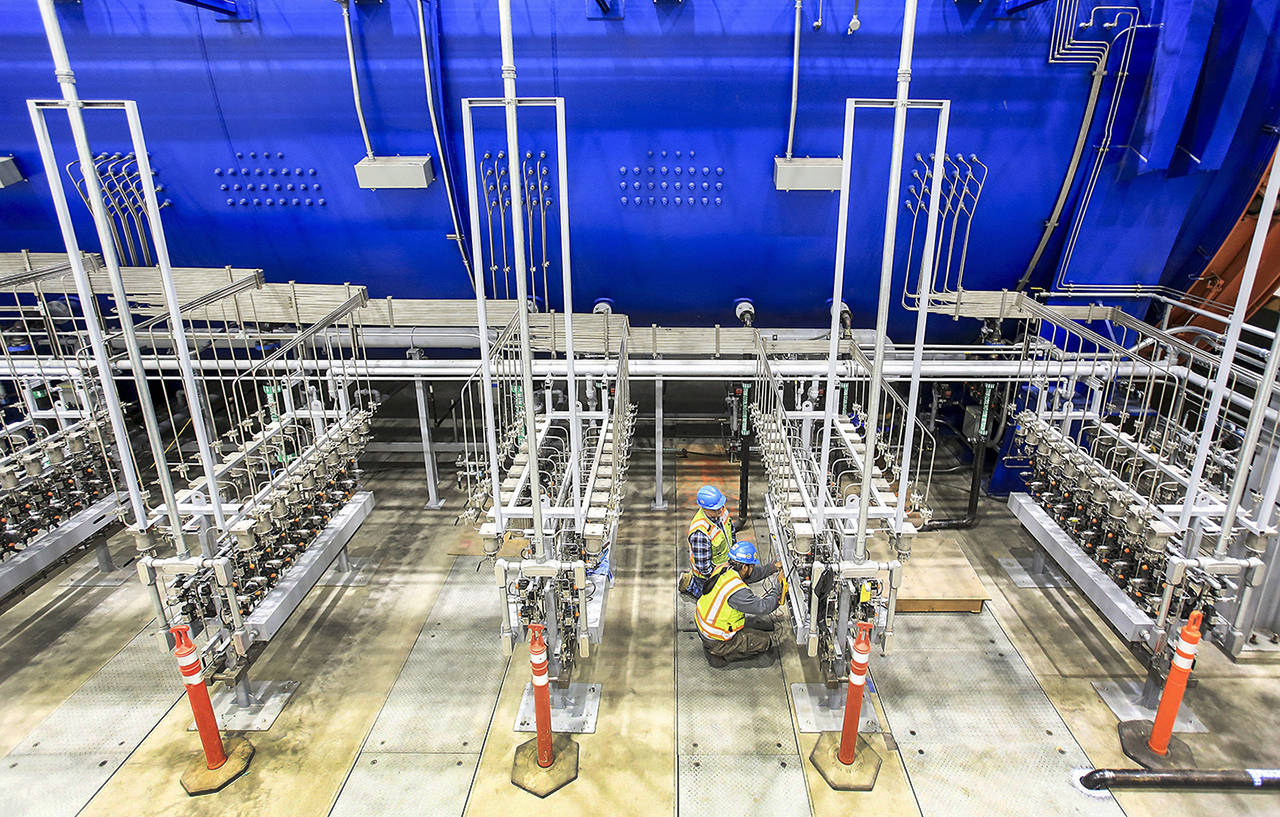OLYMPIA — Aerospace companies that save bundles of dollars through tax breaks — billions in the case of the Boeing Co. — rallied Thursday against renewed calls for knitting a firm’s receipt of those perks with the number of people they employ.
Executives of Boeing and several firms voiced concerns at a public hearing on a report examining whether the tax breaks enacted in 2003 and extended in 2013 were doing what lawmakers wanted them to do — namely cut business costs, preserve the industry, ensure good-paying jobs, and “maintain and grow” the aerospace workforce.
That analysis by the state legislative auditor found costs are lower and workers are earning good wages, but there is no clear link between the tax breaks and job creation. There are more aerospace workers in Washington now than in 2003, but fewer than in 2013, it found.
Moreover, the auditor couldn’t find clear evidence that the tax break extension influenced Boeing’s decision to build the 777X in Everett.
The auditor is recommending lawmakers amend existing law to add another goal, like a baseline level of employment for companies receiving tax breaks. That would make it easier in future audits to figure out if they are paying off.
Aerospace officials rebutted the need for such clarification at Thursday’s hearing of the Citizens Commission for the Performance Measurement of Tax Preferences. The panel will decide next month whether to endorse the auditor’s suggestions before they are sent to lawmakers.
The preferences “are working exactly as intended,” said Emily Wittman, president and CEO of the Aerospace Futures Alliance, which lobbies on behalf of the industry.
Clay Hill, government affairs director for the Association of Washington Business, urged the five-member commission not to endorse the auditor’s finding and assess the success of the tax breaks from their beginning, in 2003. In that light, aerospace employment statewide is 38 percent higher and there are many more companies in the industry.
“When performance is properly measured, the facts are unmistakably clear,” he said.
State lawmakers and then-Gov. Gary Locke enacted incentives for the aerospace industry in 2003 to land the 787 Dreamliner assembly line for Washington. Those tax preferences were to expire in 2024.
During a November 2013 special session, legislators and Gov. Jay Inslee agreed to a 16-year extension, to 2040, to help convince Boeing to build the 777X in the state. It is projected the extension will enable aerospace firms to save close to $8.7 billion in tax payments, nearly all of it accruing to Boeing.
Bill McSherry, vice president of government operations for the Boeing Co., assured commissioners of the importance of the 2013 action.
“As a direct result of the extension of the tax incentives in 2013 and the contract with our manufacturing union, the IAM, Boeing made a $1 billion investment in Everett to construct the 777X composite wing center,” he said. “The incentives were a deciding factor in siting the 777X in the state.”
Andy Nicholas, associate director for the Washington State Budget and Policy Center, urged commissioners to back the auditor’s recommendation. He also suggested they go further and ask lawmakers to enact changes allowing portions of tax breaks to be “clawed back” by the state when job creation goals are not met.
“We are deeply concerned about the steep aerospace job losses our state has endured since the tax subsidy program was expanded,” he said. “To be honest, what people care about when it comes to these subsidies are good jobs. That is the goal Washingtonians are very concerned about here and I think there’s strong reason to believe we’re not getting our money’s worth.”
Nicholas also said he didn’t think the 2013 extension played a big role in Boeing’s decision.
During a spirited exchange on the subject with Commissioner Ronald Bueing, Nicholas said he is “not convinced” tax breaks alone actually change a company’s behavior.
“What it really tells us is what we already know — it was successful in one thing, reducing Boeing’s taxes,” he said.
The citizen commission tackled this same subject in late 2014 following the last review of aerospace tax breaks.
At that time, the bipartisan 16-lawmaker Joint Legislative Audit Review Committee recommended there be new requirements for businesses to set measurable goals of job creation or maintenance, and to certify with the state Department of Revenue the number of jobs created from the use of tax preferences. The auditor had a similar suggestion — backed by the commission — that lawmakers provide more detail on what they wanted to see such as any desired increase in jobs.
Legislation did get introduced in 2015 and 2016 that would have tied Boeing’s continued receipt of tax breaks to its employment levels. But it did not receive a vote.
Hill, of the Association of Washington Business, told commissioners Thursday the lack of action was the Legislature’s way of saying it is comfortable with the level of clarity in the law.
On Oct. 9, the panel will decide whether to endorse the legislative auditor’s suggested changes.
“There’s absolutely no doubt the aerospace industry is hugely important to the Washington economy,” Andi Nofziger-Meadows, a commissioner and president of the Edmonds Education Association, said after the meeting.
“I don’t think that having clear performance targets is a bad thing,” she said. “What those performance targets are for the industry is not for us to decide. I am always in favor of having clear performance targets.”
Jerry Cornfield: 360-352-8623; jcornfield@herald net.com. Twitter: @dospueblos.
Talk to us
> Give us your news tips.
> Send us a letter to the editor.
> More Herald contact information.

























